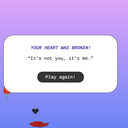The swiping fixation: Singles are getting hooked on the gamification of online dating

Published Date: 2/14/2020
Source: axios.com
Editor's note: This deep dive was originally published on Valentine's Day, 2019.The gamification of courtship has gone global, from viral matchmaker shows in China to Tinder users who don't stop swiping even after finding love. The big picture: Apps are the new norm in dating. But the hyper-personalized and endless choices enabled by technology may actually be making it more difficult to meet “the one.” Gamification is now built into dating:TV series like "The Bachelor," China's "If You Are the One" and Britain's "Love Island" have played off cultural courting traditions to create popular, dramatic and competitive game shows. In apps, the format of swiping can intensify pleasurable chemical reactions in the brain, and the “infinite scroll” persuades users to continue swiping into perpetuity. With almost endless options for partners, dating has become about "fast sex, slow love," Helen Fisher, chief scientific adviser for Match.com told Axios."The mechanics of the swipe feature: It's fun, it's a yes or no game."Justin McLeod, CEO and founder of the dating app HingeBy the numbers: Millennials spend 10 hours per week on dating apps, according to Badoo, the world’s most popular dating platform with more than 400 million users in 190 countries. And almost one in six singles (15%) say they feel addicted to the process of looking for a date, per a 2017 Match survey.Why it matters: Part of playing the game is to make yourself as desirable as possible, which can lead to high, unmet expectations."We’re showing people this near perfect version of ourselves. It is highly tailored," Ohio State University's Jesse Fox told Axios. "You build up your hopes and expectations and then you meet — and it's awkward." Many dating app executives who spoke with Axios are wary to call the platforms a game. "People are trying to maximize to find the ideal," Bumble's in-house sociologist, Jessica Carbino, suggests, "which is the sort of market nature of love.""People are able to go on more dates, find more people and, as a result, they're actually waiting longer to get married than ever before, but they're also, I think, choosing the best partner for them," McLeod said.The bottom line: In 2017, 39% of U.S. heterosexual relationships and 65% of same-sex relationships began online. And apps aren't going away. For some, "it's a form of work, not just a game anymore," says Stephanie Tong of Wayne State University.A cottage industry of services to write profiles, tend to matches and get swipes is popping up. Some, like Relationship Hero, have coaches around the world, available 24/7 to text, call or even video chat through a user's dating woes. Now, Tong says, it isn't about projecting confidence face-to-face but about how to write a fancier profile. Go deeper: The new rite of passage: Young, busy and still singleBy the numbers: Online dating is losing its stigmaFacebook wants to be your matchmakerThe loneliness epidemic: Singles turn to matchmakers for helpThe price we'll pay for a dateOnline dating can expose users to privacy breachesThe inhumanity of automated matchmakingWhat dating apps are doing to fight biasYou're most likely to get "ghosted" in Austin